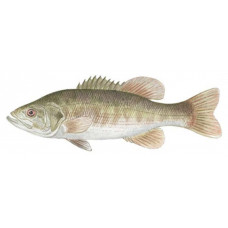Latin name
Micropterus coosae
Other names
Black bass, Coosa bass, shoal bass, Flint River smallmouth.
Identification
Redeye bass is distinguished by a significant amount of red coloration in its eyes. It is bronze-olive above, with brownish or greenish sides, and yellow-white or blue below, usually with dark vertical stripes on the sides. The stripes on the tail are diamond-shaped with lighter centers. It has a prominent dark spot on the gill cover and rows of dark spots on the underside, as well as white upper and lower outer edges on the tail with an orange tint. The upper jaw of its large mouth extends to the back of the eye, but not beyond, and its tongue usually has a patch of teeth. It has redder fins than other black perches. The first and second dorsal fins are connected, and the second dorsal and caudal fins and the front part of the anal fin are brick red in young fish. There is a dusky spot at the base of the tail, which is also darkest in young fish. There are 12 dorsal rays and 10 anal rays.
Distribution
Redeye bass are found in the Alabama, Savannah, Coosa, Chattahoochee, and Warrior Rivers in Georgia and Alabama, and in southeast Tennessee (Conasauga watershed). They have been introduced to a limited extent in California, Puerto Rico, and the upper Cumberland River in Kentucky. Shoal bass are found in the Apalachicola River system in Florida and in the Chattahoochee, Chastity, and Flint Rivers in Georgia.
Habitat
Inhabiting rocky channels and pools of streams and small to medium-sized rivers, red-eye bass prefer the cold headwaters of small streams. They are rarely found in natural lakes, ponds, or reservoirs and prefer water temperatures in the mid-60s. They most often thrive in habitats in the main channel.
Size
The Redeye bass grows to 181⁄2 inches and about 3 pounds, although some individuals reach more than 8 pounds and live up to 10 years. The shoal form grows faster, although it usually reaches a length of about 15 inches. The world record for all tackle is an 8-pound, 12-ounce fish caught in Florida in 1995.
Life history and Behavior
Spawning occurs in spring when water temperatures are 60° to 70 °F, usually over coarse gravel in the upper reaches of the reservoir. The males build the nest and guard the eggs and fry.
Food and feeding habits
Redeye feed mainly on terrestrial and larval insects, crustaceans, and small fish.
Reproduction
No information
| Classification | |
| Phylum | Chordata |
| Class | Actinopterygii |
| Squad | Perciformes |
| Family | Centrarchidae |
| Genus | Micropterus |
| Species | M. coosae |
| Features | |
| Conservation status | Least Concern |
| Habitat | Pelagic |
| Life span, years | No information |
| Maximum body weight, kg | 2.34 |
| Maximum length, cm | 47 |
| Sailing speed, m/s | No information |
| Threat to people | Edible |
| Way of eating | Predator |


